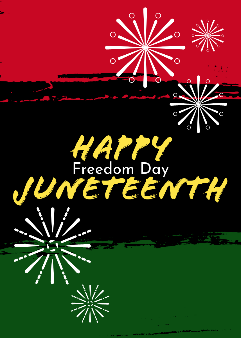
In the last few years we have heard more and more about it, especially since agencies, companies, and states began to recognize it as a holiday, giving their employees a day off and another excuse to throw burgers on the grill. At the risk of sounding too political, there are two schools of thought around the day: Those who believe it to be unnecessary for another **black holiday** and those who see the importance of recognizing the true end of slavery and the civil war.
For a quick history lesson, Juneteenth, or June 19th, (Also called Jubilee Day, Emancipation Day, Freedom Day, and Black Independence Day) is the day to commemorate when the final battalion of around 2,000 Federal Army troops marched into Galveston Bay, Texas, and did what slave owners in that town failed to do: informed the over 250,000 men, women, and children of African descent that they were free from slavery by executive decree of the Emancipation Proclamation. June 19, 1865 marked the historic end to slavery across the United States of America. It is important to note that although the Emancipation Proclamation was signed in by President Abraham Lincoln on January 1, 1863, and the American Civil War technically ended on May 26, 1865, it took an entire two years, and three and a half weeks, before the news made it to the great state of Texas. So while others consider this to be black history, it’s actually documented American history and part of our story of becoming “a more perfect union.”
As an African American, a first generation born African, and a proud American, celebrating Juneteenth means more to me than a day off. Considering that slaves weren’t allowed to read or write, the simple fact that I am able to express myself through the written word is enough to put a warm spot of pride in my chest. From a time when a person of black skin was considered three-fifths of a man and property of another, to a time when Americans of African descent have graduate degrees, and are entrepreneurs, doctors, lawyers, hold public office, even the highest office in the land. From a world where women who looked like me could barely hold onto their children, to a world where people like me own land and property where our children and grandchildren and great grandchildren continue to be free. That is what Juneteenth means to me.
On June 17, 2021, President Joe Biden signed into law the observance of Juneteenth as a federal holiday. It also marked the first time in almost forty years that the United States established a federal holiday, the last one being Martin Luther King Jr. Day in 1983, another seemingly **black holiday**. As more and more people embrace the history of this historic day, I am reminded of the words of James Baldwin (who was a grandson of a slave), a prolific writer, author, and social activist in the 20th century: “Not everything that is faced can be changed, but nothing can be changed until it is faced.” Observing Juneteenth is a way of facing the tragedy of our past, and looking at how far we have come as a nation.
And by no means does the celebration of Juneteenth implies that racism, discrimination, and prejudice is over. Too this day there are countless stories of people of color killed at the hands of others who continue to see our melanin as a threat. But it is a reminder that there are those who stood on the right side of justice, and would not stop until we all experience that same level of freedom.
So have your parties, your barbecues, your day to relax at the beach, or camping under the stars. Just remember to put up your red, black, and green Pan-African flag alongside your red, white, and blue one. The colors are different, but the meaning behind them are one in the same: Hope. Unity. Equality. Freedom.
Happy Juneteenth!
Love,
Eskay Kabba

